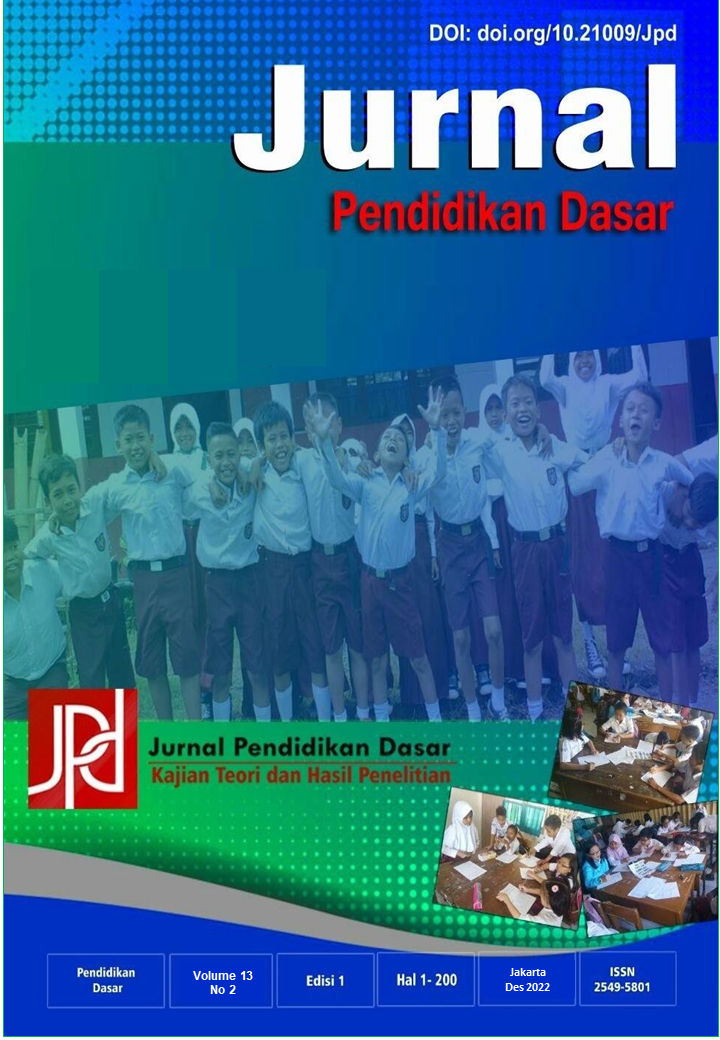EVALUASI KEBIJAKAN PROGRAM KAMPUS MENGAJAR ANGKATAN 3 DI SD NEGERI TUMBREP 01
DOI:
https://doi.org/10.21009/jpd.v13i2.28385Keywords:
Public Policy, Evaluation, Kampus Mengajar ProgramAbstract
Kampus Mengajar is one of the public policy products launched by the Directorate of Learning and Student Affaira of Indonesia Ministry of Education and Culture. This program aims to provide opportunities for students to be able to hone their leadership spirit, character and have teaching and learning experiences. It is hoped that the kampus mengajar program can increase the effectiveness of the learning process during the Covid-19 pandemic. The purpose of this study was to describe and analyze the evaluation of numeracy and literacy education through the Kampus Mengajar batch 3 at SD Negeri Tumbrep 01. The type of research used was descriptive with a qualitative approach. This research use CIPP evaluation method (Context, Input, Process, and Product). The results of the evaluation using CIPP method, there are still several obstacles that must be resolved for the success of the next generation of Kampus Mengajar programs. These obstacles include the limitations of teaching staff and infrastructure and the lack of awareness of students and student parent in helping the successful implementation of the kampus mengajar batch 3 at SD Negeri Tumbrep 01.
References
Anisykurillah, R. (2020). EVALUASI PEMBANGUNAN PENDIDIKAN KEAKSARAAN ( Studi pada Program Pendidikan Non-Formal di Kota Malang ) EVALUATION OF LITERACY EDUCATION DEVELOPMENT ( Study on Non Formal Education Programs in Malang City ). 15, 25–36.
Anwar. (2020). Online learning amid the COVID-19 pandemic: Students perspectives. Journal of Pedagogical Sociology and Psychology, 1(2), 45–51. https://doi.org/10.33902/jpsp.2020261309
Anwar, R. N. (2021). Pelaksanaan Kampus Mengajar Angkatan 1 Program Merdeka Belajar Kampus Merdeka di Sekolah Dasar. Jurnal Pendidikan Dan Kewirausahaan, 9(1), 210–219. https://doi.org/10.47668/pkwu.v9i1.221.
Budi, Winarno. (2002). Kebijakan Publik, Teori dan Proses. Yogyakarta: Media Presindo, 2002,hal. 14 ‐ 15.
Djamarah, Syaiful Bahri. (2008). Psikologi Belajar. Jakarta: Rineka Cipta.
Dunn,William . 2013. Pengantar Analisa Kebijakan Publik. Yogyakarta: Gadjah Mada Press.
Surat Edaran Nomor 4 Tahun 2020, 300 (2020).
Peraturan Menteri Pendidikan Dan Kebudayaan Nomor 03 Tahun 2020 Tentang Standar Nasional Perguruan Tinggi, (2020).
Riyanda, A. R., Herlina, K., & Wicaksono, B. A. (2020). Evaluasi Implementasi Sistem Pembelajaran Daring Fakultas Keguruan dan Ilmu Pendidikan Universitas Lampung. Jurnal IKRA-ITH Humaniora, 4(1), 66–71. https://journals.upi-yai.ac.id/index.php/ikraith-humaniora/article/view/669.
Samodra Wibawa, 1994, Kebijakan Publik :Proses dan Analisis, Cet.Ke-1, Jakarta: Intermedia.
Saefulmilah, R. M. I., & Saway, M. H. M. (2020). Hambatan-Hambatan Pada Pelaksanaan Pembelajaran Daring Di Sma Riyadhul Jannah Jalancagak Subang. Nusantara : Jurnal Pendidikan Dan Ilmu Sosial, 2(3), 393–404. https://ejournal.stitpn.ac.id/index.php/nusantara
Uno, H.(2011). Teori Motivasi dan Pengukurannya. Jakarta: PT Bumi AksaraBandung PT Remaja Rosdaka Karya.
Yuangga, K. D., & Sunarsi, D. (2020). Vol. 4 No. 3 Juni 2020. ( Kharisma Dan Denok, 2020 ), 4(3), 51–58.
Downloads
Published
How to Cite
Issue
Section
License

This work is licensed under a Creative Commons Attribution 4.0 International License.
Jurnal Pendidikan Dasar





















